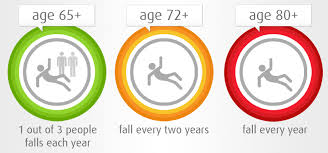 PERS Insider helpfully listed the most common PERS Google searches. The result was bleak and informative. Their website identifies the top item (16,000 searches, results with ads) as a 'medical alert bracelet'. Except for the deep-pocketed Medical Guardian which bought ads everywhere, these were all bracelets to help emergency workers determine a health issue. The next one, Medical alert systems (14K searches) turned up ads for multi-vendor sales sites with names like 10 best, 5 best in Florida, and look, there's Medical Guardian! The US News site was not an ad itself, but the article was filled with ads for devices. Ditto for ConsumerAffairs.com. Best and worst companies – more ads -- and Medical Guardian. Even 'I’ve Fallen and I Can’t Get Up' is one of top four search terms (4800), no doubt from those miserable LifeAlert ads.
PERS Insider helpfully listed the most common PERS Google searches. The result was bleak and informative. Their website identifies the top item (16,000 searches, results with ads) as a 'medical alert bracelet'. Except for the deep-pocketed Medical Guardian which bought ads everywhere, these were all bracelets to help emergency workers determine a health issue. The next one, Medical alert systems (14K searches) turned up ads for multi-vendor sales sites with names like 10 best, 5 best in Florida, and look, there's Medical Guardian! The US News site was not an ad itself, but the article was filled with ads for devices. Ditto for ConsumerAffairs.com. Best and worst companies – more ads -- and Medical Guardian. Even 'I’ve Fallen and I Can’t Get Up' is one of top four search terms (4800), no doubt from those miserable LifeAlert ads.
Affiliate marketing (pay to play) is the name of this search game. This is a product that is Googled at the worst of times -- Mom fell, is being released from the hospital, lives alone, walks a dog at night, we're worried. So call to get the best deal – even seniorliving.org, which sounds like a non-biased review site – gets a piece of every sale. There were only 900 searches for 'Personal Emergency Response System' – which is what this 30-year-old product actually is. Do the perhaps-desperate users benefit from this ad-driven affiliate structure? Does the anxious searcher notice the tiny symbol indicating they are viewing an ad? Should vendors improve their web marketing, as PERS Insider advises? Maybe so if they’re not the ubiquitous Medical Guardian, which shows up regardless of phrasing, even when you click through to the first result for the variant 'I’ve Fallen and I can’t Get Up.'
This category (and its much-marketed terminology) is quite literally old news. The market subject is a frail older adult, likely female. Fear still rules messaging – top search terms are the result, not the cause. The vendors know that their traditional user is aging with significant chronic conditions – and so they tiptoe quietly into Remote Patient Monitoring (RPM) and thus are being acquired. VRICares (acquired), MobileHelp (acquired), Anelto – already in RPM. RPM is a $16 billion market, with a goal to reduce hospital admissions and lower costs. Compare that to the PERS $1-2 billion market. Oh, and did we mention that that there is a CPT code for RPM that enables Medicare reimbursement? And there is a useful chart for the 10 most common chronic diseases to help vendors get started.
The older and frailer need remote monitoring of multiple types. Sensor-based room activity monitoring of motion and falls is on the radar of Vayyar, Amazon, and Origin Wireless (with its Wi-Fi based fall detection). As for the younger among the 54 million individuals aged 65+, they need a smarter watch or activity band, that encourages, uh, activity. It should not be from Verizon (see reviews on its own website). As time goes on, that device needs to be connected to a monitoring center for triage, not 911, as with Apple watch alone. As an individual’s chronic diseases progresses, families and care providers should add appropriate nurse-monitored RPM technology which qualifies for Medicare-based reimbursement. This includes for home care agencies, which desperately need revenue sources that are less labor- and more tech-dependent. Oddly, RPM seems to be the one offering that is NOT currently visible on the Medical Guardian website.With their $100 million investment from Water Street and their less-than stellar watch offering, one would imagine they would get into the RPM market. Or maybe they will move further into the smarter watch space? Or perhaps their intent is to be the last traditional 'medical alert.'

Comments
You nailed it re: PERS Ads, RPM, & Home Care Agencies
As you may know we, BlueStar, transformed our company into BlueStar TeleHealth over a year ago and we are growing our client base and patient count at a rapid clip. Our legacy PERS business continues to plod along but it is mainly on auto-pilot at this stage.
Thank you for the excellent and very interesting article, Laurie.